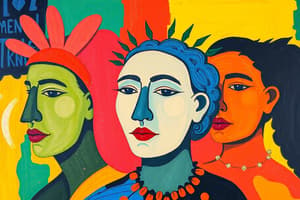Podcast
Questions and Answers
What significance does land hold for the Lumad tribes?
What significance does land hold for the Lumad tribes?
Land holds great significance for the Lumad tribes as they believe it is sacred and provides sustenance for their communities.
How do Lumad tribes use music in their cultural practices?
How do Lumad tribes use music in their cultural practices?
Tribal music is a significant part of their identity, often featuring instruments like gongs and drums played during celebrations and rituals.
What does the term 'Lumad' represent in the Visayan languages?
What does the term 'Lumad' represent in the Visayan languages?
The term 'Lumad' literally means 'native' in the Visayan languages.
Name three ways in which the Lumad tribes use their knowledge of land resources sustainably.
Name three ways in which the Lumad tribes use their knowledge of land resources sustainably.
How are traditional Lumad dances connected to their history and daily life?
How are traditional Lumad dances connected to their history and daily life?
What instruments are often used in Lumad tribal music?
What instruments are often used in Lumad tribal music?
Provide two examples of Lumad ethnic groups.
Provide two examples of Lumad ethnic groups.
How do Lumad tribes conserve their ancestral domains?
How do Lumad tribes conserve their ancestral domains?
What role do the Manobo tribes play in the collective group of Lumad?
What role do the Manobo tribes play in the collective group of Lumad?
What livelihood practices do Lumad tribes engage in?
What livelihood practices do Lumad tribes engage in?
Flashcards are hidden until you start studying
Study Notes
Spiritual Beliefs and Rituals
- Deep connection to nature with beliefs in spirits and deities governing various life aspects.
- Rituals and ceremonies conducted to honor spirits, seek protection, ensure harvests, and maintain natural harmony.
- Common offerings include live animals—such as pigs and chickens—to express gratitude and seek blessings.
Social Structure and Governance
- Communities led by chieftains or tribal leaders, who follow customary laws for decision-making.
- Elders play a crucial role, using their wisdom and experience to guide community decisions.
- Unique social structures exist within each tribe, governing interpersonal relationships.
Traditional Practices and Livelihood
- Engagement in traditional livelihoods like farming, hunting, fishing, and gathering.
- Sustainable agriculture practiced through swidden farming (slash-and-burn) to cultivate crops while preserving the environment.
- Traditional crafts such as weaving, pottery, and beadwork are vital cultural expressions.
Sacred Beliefs and Health Interpretations
- Mountains are considered sacred, with death and illness viewed as signs of divine anger.
- Animals offered during tribal ceremonies for blessings related to harvest, health, protection, and thanksgiving.
Cultural Diversity among Lumad Tribes
- Southern highland Lumad primarily engage in swidden farming and have minimal trade.
- Bagobo community is led by warrior classes known as magani or bagani, recognized for elaborate dress and adornments.
- T’boli and Teduray tribes are noted for crafting baskets, trinkets, and earrings, especially T’boli’s prized t’nalak fabrics inspired by dreams.
Geographic Isolation and Cultural Preservation
- Higaonon, referred to as "mountain dwellers," maintain traditions due to geographic separation in the mountains and plateaus of Bukidnon.
- Mandaya, Agusan Manobo, and Ata share cultural traits and institutions, exercising slash-and-burn farming and maintaining trade with neighboring tribes.
- Warriors, led by the datu, are highly respected in these cultures.
Studying That Suits You
Use AI to generate personalized quizzes and flashcards to suit your learning preferences.




